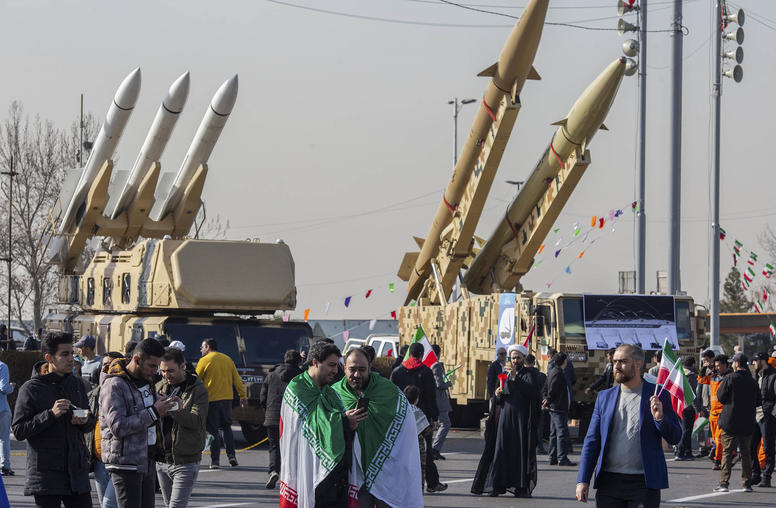The Syrian Uprising’s Impact on Lebanon
USIP’s Mona Yacoubian explores the impact of unprecedented unrest in Syria on neighboring Lebanon.
May 9, 2011
- What are the implications of the uprising in Syria for Lebanon?
- How have Lebanon’s leading political actors responded to the uprising, including the March 14 and March 8 coalitions?
- Does the Syrian uprising have implications for U.S. interests in Lebanon, in particular with respect to America’s stated aim of promoting a democratic Lebanese government whose sovereignty extends throughout Lebanese territory?
What are the implications of the uprising in Syria for Lebanon?
Syria’s seven-week long uprising has significant implications for neighboring Lebanon, particularly given the deep intertwining of politics, social dynamics, and history that bind these two countries. Once a hegemonic power in Lebanon, Syria continues to wield enormous influence in the political, economic, and security realms of its small, fragile neighbor. The greatest concern centers on the Syrian unrest’s impact on Lebanon’s precarious security situation, notably the potential for events in Syria to sharpen existing sectarian tensions in Lebanon.
In late April, a reported 1,000 Syrian refugees fleeing mounting violence sought safe haven in northern Lebanon. While Lebanon has yet to witness massive refugee flows from Syria, a refugee influx could easily tip Lebanon’s delicate sectarian balance. Over the past few years, Tripoli, Lebanon’s second largest city, has witnessed worrying episodes of sectarian unrest between its Sunni and Alawite populations. Lebanon’s Alawites are a minority in the predominantly Sunni area, hailing from the same Shiite offshoot sect as Syrian President Bashar al-Assad. Armed Lebanese Alawite groups reportedly have received weapons and financing from Syria in the past.
Since the onset of Syrian unrest, Tripoli has remained largely calm. However, many fear that as the violence in Syria intensifies, it could easily spill over into Lebanon.Over the long term, prolonged unrest or chaos in Syria could unleash widespread sectarian violence across Lebanon. Sectarian tensions have already been heightened over the past several months in anticipation of indictments to be released by the United Nations Special Tribunal for Lebanon. It is widely believed that the court—established to prosecute those responsible for the February 2005 assassination of former Lebanese Prime Minister Rafiq Hariri—will accuse members of the Shiite militant group Hezbollah in the murder of the Sunni leader. The announcement of these indictments could provoke sectarian unrest in Lebanon which could be further exacerbated by the Syrian uprising. Moreover, should Syrian President Asad feel increasingly threatened by the uprising, he may opt to provoke unrest in Lebanon as a diversionary tactic.
How have Lebanon’s leading political actors responded to the uprising, including the March 14 and March 8 coalitions?
During the initial outbreak of the Syrian uprising in mid-March, various Lebanese factions held small-scale demonstrations both supporting and opposing the Syrian protests. However, concerns quickly mounted that the demonstrations would provoke broader unrest in Lebanon. As a result, all Syria-related protests have been banned in Tripoli, and Lebanon’s two primary political factions—the March 8th and March 14th blocs—have been virtually silent on Syria. Most notably, members of the March 14th alliance—a staunchly anti-Syrian coalition—have muted any criticism of the Syrian regime, likely fearful of any blowback in Lebanon. Meanwhile, Syrian officials have accused elements of the Future Movement, a key member of the March 14th bloc, of funneling weapons to anti-regime elements inside Syria and warned that any provocations emanating from Lebanon would not be tolerated.
For their part, members of the Syrian-allied March 8th bloc have issued vague statements supporting stability in Syria. Lebanon’s President Michel Suleiman has made similar statements throughout the current period of unrest. However, the March 8th bloc has remained primarily focused on forming a government. Since late January, Lebanon has been without a government when Hezbollah-allied ministers withdrew from the cabinet citing differences over the UN tribunal. With a slight parliamentary majority, the March 8th bloc has been empowered to form a cabinet, but has not yet been successful following more than three months of negotiations. The Syrian uprising could further delay prospects for government formation in Lebanon as factions warily monitor the Syrian unrest. Meanwhile, Hezbollah, which relies on Syria as an important conduit for arms and its staunch support for the “resistance,” has maintained its public support for Damascus, but privately is surely weighing its options.
Does the Syrian uprising have implications for U.S. interests in Lebanon, in particular with respect to America’s stated aim of promoting a democratic Lebanese government whose sovereignty extends throughout Lebanese territory?
The Syrian uprising has important implications for U.S. interests in Lebanon. Syrian unrest has already contributed to a deepening unease in Lebanon over the prospects for sectarian violence. Should the situation in Syria deteriorate into more widespread unrest, the potential for destabilizing spillover into Lebanon would rise significantly. Sectarian unrest in Lebanon would in turn undermine any hopes for a stable, democratic government. Equally concerning, Syria could decide to precipitate unrest in Lebanon, either to punish those who supported the Syrian uprising or to distract attention from its domestic problems. Moreover, if the Syrian regime is successful in brutally quashing the Syrian uprising, it may also re-assert itself inside Lebanon in order to pre-empt any further unrest in Syria. Any of these scenarios would result in a troubling resurgence of Syrian influence in Lebanon, further undermining Lebanon’s already fragile sovereignty.
Explore Further
- Recent Violence in Syria
On the Issues by Steven Heydemann | May 9, 2011 - Eye on the Middle East and North Africa: Experts from the U.S. Institute of Peace (USIP) are closely following developments throughout the Middle East and North Africa. In a series of reports and interviews, they cover a wide range of issues.



